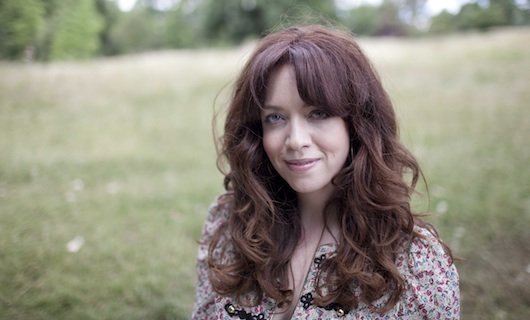A leading light in the new generation of psychological crime writers, Erin Kelly’s 2010 debut The Poison Tree was praised by Stephen King, who compared its powerful suspense to Daphne du Maurier’s Rebecca. The novel about a suburban student who embraces a new bohemian life in a crumbling Highgate mansion – until something terrible happens – was adapted for a two-part ITV drama last December. Kelly, a Warwick University English literature graduate based in North London, followed that with The Sick Rose (The Dark Rose in the US). The Burning Air, a twisting novel of family secrets and revenge, arrived just weeks before the novelist and journalist’s second daughter was born earlier this year. It’s released in paperback on 29 August, so we asked Erin Kelly a few questions about her new book and her career so far…
Which writers inspired your psychological crime writing?
Ruth Rendell and Daphne du Maurier, they’re the two biggest influences on me, and also early Ian McEwan – The Cement Garden is a perfect psychological thriller – Kate Atkinson and Tana French. But I’ll read anything. I certainly don’t only read psychological thrillers by women.
Do you feel your chosen genre is removed from the literature you studied at university or is psychology crucial to all types of novel?
Psychology is at the heart of every good story. You can’t write a good story unless you understand human nature because most plots are still driven by relationships – Macbeth, Great Expectations, Wuthering Heights. Now if I read a really good book, sometimes I’ll go back immediately and re-read it to see what makes it work. It’s like taking apart an engine. The last time I did it was Broken Harbour by Tana French. A long time ago I did it with The Secret History as well.
What does that familiar, middle-class suburban setting bring to a crime novel?
Well, I think one of the reasons why suburbia is so powerful is because it’s where most of us live. I love a good country house murder but it’s not particularly relatable is it? It’s the idea of something happening next door which I think is very powerful and very unsettling, and the idea that a story could be about your neighbour or your colleague. There’s a particular kind of eeriness to it. I think one of my favourite reviews I ever had called me an expert of the suburban macabre. I’m really trying to exploit circumstances that we all know.
I knew exactly what the story was going to be but working out the best way to tell it for maximum suspense was more challenging than the other books. I really liked writing Rowan in particular because my first two books were written – The Poison Tree entirely and The Sick Rose partially – from the point of view of a woman in her 30s like me, and I loved trying to get into my dad’s head basically. Rowan as a character is my dad’s age and my dad is also a retired head teacher, although we’re not nearly as posh as they are. No-one’s going to accuse me of being autobiographical.
The novel begins with a quote from An Inspector Calls. Are you exploring similar themes of middle-class culpability in the downfall of the teenage Darcy?
The play came on television when I’d already started the book and the parallel was really obvious. In An Inspector Calls it’s all accidental culpability, it’s tiny slights that build up. The real challenge of writing Darcy is that the character is completely delusional with a really fragile grip on reality, but that means as an author you have to be in tighter control of a character like that than with anybody else. And I think when you present somebody as a child to begin with it immediately instills more sympathy than if you’d suddenly met this person as a teenager.
Did you know some American readers think the fictional cathedral town of Saxby is real?
I like the idea of them ringing Visit England. It’s actually a composite town made up of places like Salisbury and Wells. It could easily exist, I think.
But the Tar Barrels festival in the Devon town of Ottery St Mary, where revellers dash around with flaming barrels on Bonfire Night, is authentic?
That’s real. I did a road trip down there for research purposes, and it’s very easy to get lost and walk a long way without being able to use your phone. The Tar Barrels Festival is just one of those bonkers English traditions. I do get a lot of emails from America saying they really love that aspect of it.
Can you tell us about the next novel?
It’s out in May 2014 and provisionally titled The Ties That Bind. It’s about a young, gay writer who escapes an abusive relationship and runs away to Brighton. While he’s there he crosses paths with a reclusive former gangster turned property dealer and he finds himself ghosting his autobiography – and the guy’s linked to an unsolved murder. Luke, the writer at the heart of the book, thinks he has solved the cold case but being one of my books he gets in over his head. In the prologue, we see him bound and gagged on the floor in a cellar in Brighton and the rest of the book is finding out how he got there and whether he’s going to make it out. It was great fun to write, I was very fond of him.
Watch for our review of The Burning Air soon…
